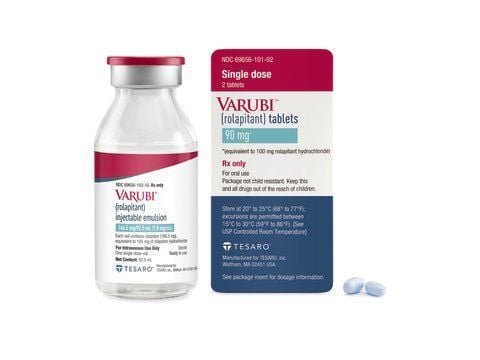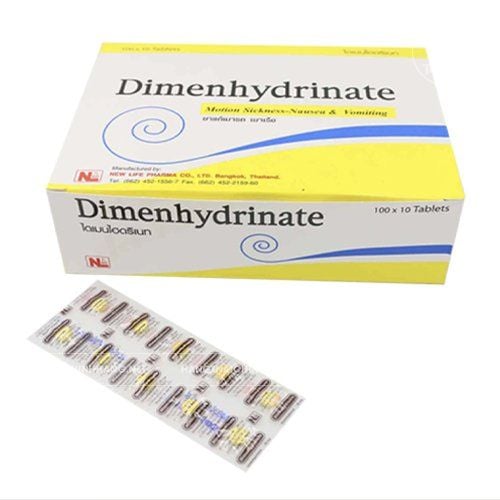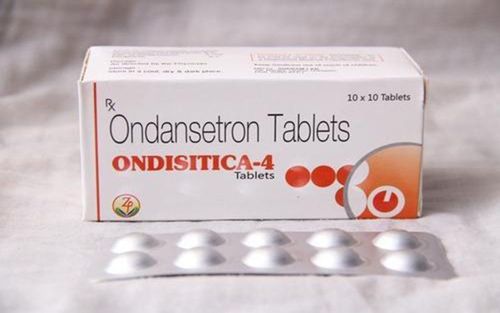This is an automatically translated article.
Dimenhydrinate is an H1 antihistamine used mainly as a prophylactic for nausea and vomiting caused by motion sickness. Dimenhydrinate drug can be used for both adults and children from 2 years of age and older, but can cause side effects on the central nervous system, digestive system, respiratory system or cardiovascular system... so caution should be taken when using dimenhydrinate. use.
1. What is Dimenhydrinate antiemetic?
Dimenhydrinate is an antiemetic of the ethanolamine class. Regarding the antiemetic mechanism, many experts believe that Dimenhydrinate reduces vestibular stimulation, affecting the cochlea, the semicircular canal of the inner ear. On the other hand, the drug also acts on the chemoreceptor area, inhibits acetylcholine in the vestibular system, thereby preventing the vomiting reflex.In addition to antiemetic, Dimenhydrinate is also an H1 antihistamine, with sedative effects causing sleep.
2. Indications and contraindications for the use of Dimenhydrinate
Indications for use of Dimenhydrinate drug in the following cases:
Prophylaxis, symptomatic treatment of dizziness, vomiting, nausea caused by motion sickness. Treatment of vomiting and dizziness in vestibular disorders or Meniere's disease. Contraindications:
Patients with a history of allergy, hypersensitivity to any component of the drug. Have a history of allergy to other antihistamines. Do not use the drug in patients diagnosed with angle-closure glaucoma. Have a disease in the urethra or prostate that leads to urinary retention. Children under 2 years old should not take Dimenhydrinate.
3. Usage and dosage of Dimenhydrinate
Dosage forms of antiemetic Dimenhydrinate:
Oral film coated tablets: Dimenhydrinate 25mg and Dimenhydrinate 50mg There is also oral syrup 12.5mg/5ml, 15mg.5ml or 12.5mg/4ml. The form of solution for injection is 10mg/ml, 50mg/ml. Chewable tablets are available in 25mg and 50mg strengths. The form of suppositories rectally 25mg, 75mg and 100mg. Dosage of Dimenhydrinate:
Oral dose:
For the treatment of vomiting in people with motion sickness:
Adults and children over 12 years old take a dose of 50 to 100mg/time, if traveling for long distances, take the next dose at 4 -6 o'clock. The total dose should not exceed 400mg/day. Children from 6-12 years old: 25-50mg/time every 6-8 hours, not more than 150mg daily. Children 2-6 years old: 12.5 to 25mg/time, 6 to 8 hours apart if needed, up to 75mg/day. Note, to prevent vomiting caused by motion sickness, it is best to take medicine 30 minutes before departure.
For the treatment of vomiting caused by Meniere's disease: For maintenance therapy, take 25-30mg/time, 3 times a day.
Injectable dose:
Adults and children over 12 years old: IM or IV dose of 50 to 100mg/time, 4 hours apart. Note that when injecting, the drug should be diluted with 0.9% sodium chloride solution in a ratio of 5:1, ie every 50mg of the drug should be mixed with 10ml of solution and then injected slowly for at least 2 minutes. In children 6 to 12 years old: 150 mg intramuscularly per day. Dosage calculation: 1.25mg/kg body weight, can be used 4 times in 1 day. Children 2 to 5 years old: calculate the same dose as children 6 years old, but the maximum daily dose should not exceed 75mg. In case of Meniere's emergency, the drug should be administered intramuscularly at a dose of 50 mg. Rectal dose:
Adults and children over 12 years old: 50mg/time. Children 8 to 12 years old: 25 - 50mg/time. Children 6 to 8 years old: 12.5 - 25mg/time. Children 2 to 6 years old: 12.5 - 25mg/time. Note for rectal suppositories, if necessary, the next dose can be administered after 8-12 hours.
4. Side effects and notes when using Dimenhydrinate
Undesirable effects of Dimenhydrinate can include:
Heart palpitations, headache, dizziness, drowsiness, feeling of restlessness and anxiety. Allergies, rash on the skin. Epigastric pain, nausea, vomiting, poor appetite. The drug can cause increased bronchial secretions, difficulty urinating, blurred vision. Use the drug with caution in some cases such as:
People who are operating machinery or must drive. Observing the phenomenon on patients who have taken Dimenhydrinate shows that the drug has the ability to depress the central nervous system, reduce the physical ability to manifest hallucinations, temporary memory loss, paranoia, and increase excitement. .. Using the drug in patients with cardiovascular disease may aggravate the disease, especially with arrhythmia, hypertension or ischemic heart disease. Dimenhydrinate is eliminated by the liver and kidneys, so caution should be exercised in patients with hepatic or renal impairment. Do not take the drug with antibiotics, because there is a risk of toxicity to the fetus. For pregnant and lactating women. Several studies have shown that the drug can cross the placenta and pass into breast milk. However, clinical practice shows that the fetus does not suffer any risk of malformations or abnormalities in development when the mother takes the drug. Therefore, Dimenhydrinate is indicated for the treatment of nausea and vomiting in pregnancy but requires the guidance of a doctor. On the other hand, there have been reports that in nursing mothers who are using Dimenhydrinate, the baby showed signs of drowsiness and irritability. Therefore, it is recommended that the mother should wean or temporarily stop breastfeeding if she needs to take Dimenhydrinate or other antihistamines, and during the use, there must be supervision from a specialist doctor. In addition, the drug can make some diseases worse, such as thyroid dysfunction, asthma, epilepsy, glaucoma, gastrointestinal obstruction... Dimenhydrinate chewable tablets contain tartrazine excipients. can cause allergic reactions, bronchial asthma, and the aspartame component in the tablet will be converted to phenylalanine after taking it, so it should be noted in people with phenylpyruvic aciduria. The drug can cause hypotension, nausea, dizziness in the elderly.
5. Notes when using Dimenhydrinate
Note in case of missed dose or overdose:
If you miss a dose: The patient should take it as soon as he remembers. Do not make up for the missed dose by taking the next dose in double. If overdose: currently there is no specific treatment in cases of overdose, mainly symptomatic treatment. Therefore, patients need to contact a specialist and immediately go to the nearest medical facility when there are abnormal signs such as dilated pupils, sudden high fever, agitation, hallucinations, convulsions, coma. ..to be handled promptly. In summary, Dimenhydrinate is an antihistamine antiemetic with sedating potential. The drug has many side effects to health, even death when overdose leads to poisoning. Therefore, do not self-medicate without a doctor's prescription. During the course of taking the drug, it is necessary to closely monitor and follow all instructions of the specialist.
Follow Vinmec International General Hospital website to get more health, nutrition and beauty information to protect the health of yourself and your loved ones in your family.
Please dial HOTLINE for more information or register for an appointment HERE. Download MyVinmec app to make appointments faster and to manage your bookings easily.













